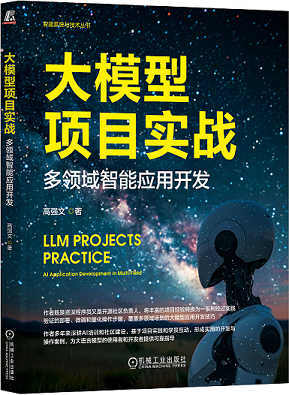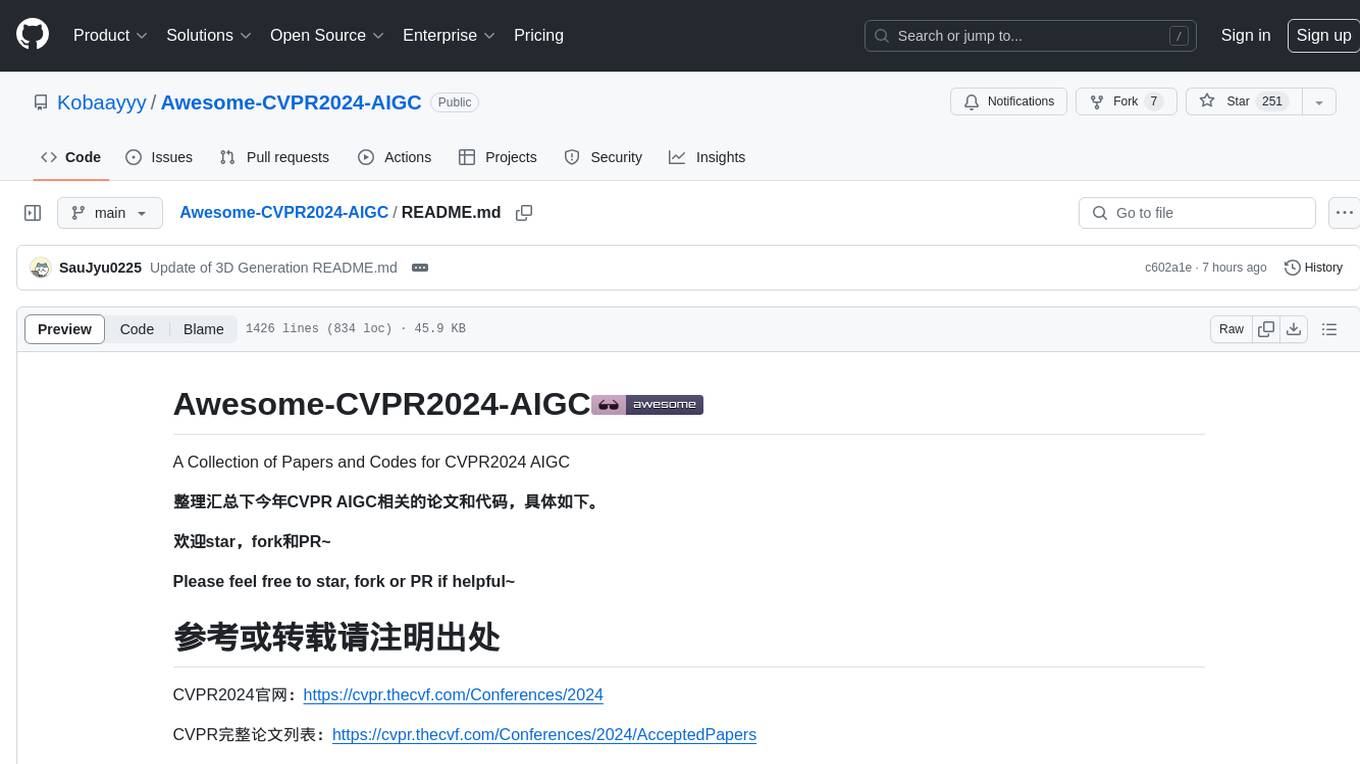
llm-dev
《大模型项目实战:多领域智能应用开发》配套资源
Stars: 63
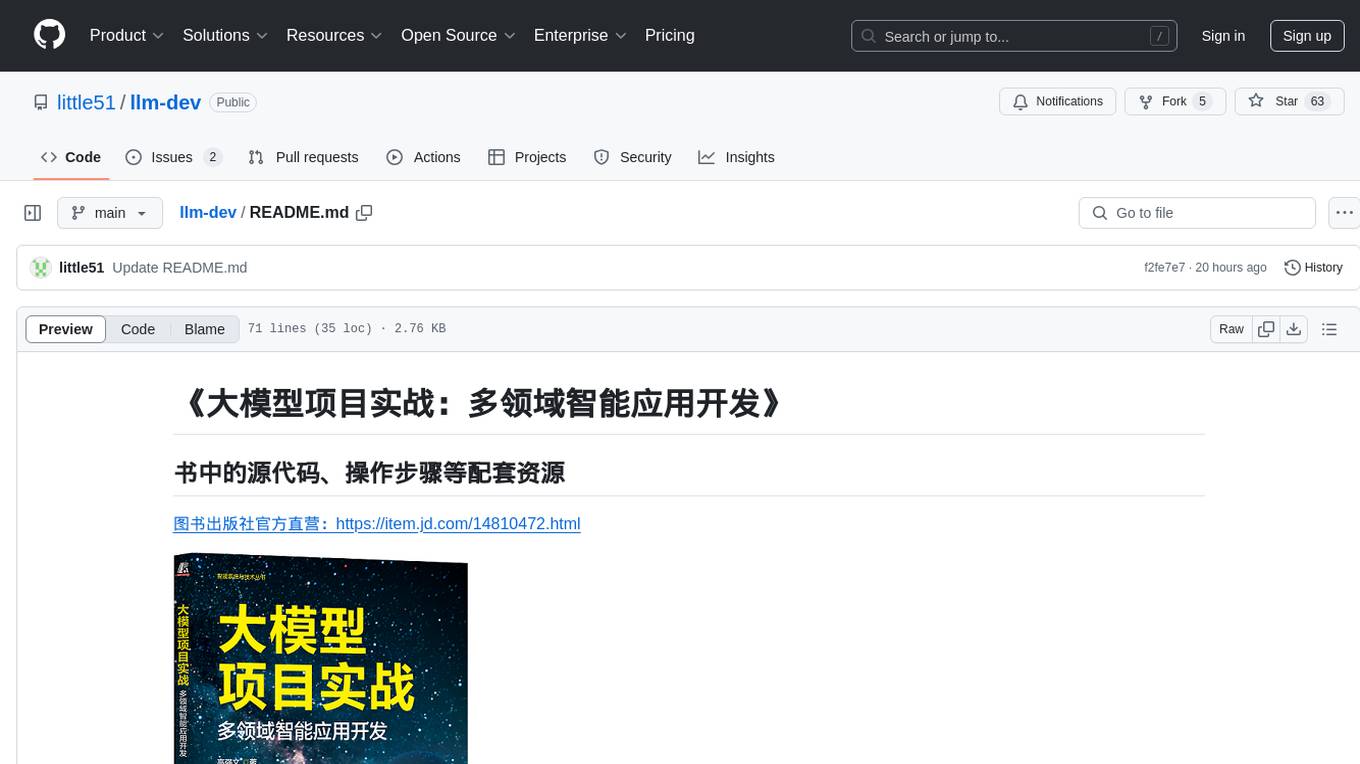
The 'llm-dev' repository contains source code and resources for the book 'Practical Projects of Large Models: Multi-Domain Intelligent Application Development'. It covers topics such as language model basics, application architecture, working modes, environment setup, model installation, fine-tuning, quantization, multi-modal model applications, chat applications, programming large model applications, VS Code plugin development, enhanced generation applications, translation applications, intelligent agent applications, speech model applications, digital human applications, model training applications, and AI town applications.
README:
图书出版社官方直营:https://item.jd.com/14810472.html
图书官方直营:https://item.jd.com/14810472.html
github缓存加速网站:https://gitclone.com/
huggingface模型下载网站:https://aliendao.cn/
基于LLM的代码生成器:https://code.gitclone.com
一键体验多个AI Agent应用:https://gitclone.com/aiit/agenthub/
For Tasks:
Click tags to check more tools for each tasksFor Jobs:
Alternative AI tools for llm-dev
Similar Open Source Tools

llm-dev
The 'llm-dev' repository contains source code and resources for the book 'Practical Projects of Large Models: Multi-Domain Intelligent Application Development'. It covers topics such as language model basics, application architecture, working modes, environment setup, model installation, fine-tuning, quantization, multi-modal model applications, chat applications, programming large model applications, VS Code plugin development, enhanced generation applications, translation applications, intelligent agent applications, speech model applications, digital human applications, model training applications, and AI town applications.

ai-enablement-stack
The AI Enablement Stack is a curated collection of venture-backed companies, tools, and technologies that enable developers to build, deploy, and manage AI applications. It provides a structured view of the AI development ecosystem across five key layers: Agent Consumer Layer, Observability and Governance Layer, Engineering Layer, Intelligence Layer, and Infrastructure Layer. Each layer focuses on specific aspects of AI development, from end-user interaction to model training and deployment. The stack aims to help developers find the right tools for building AI applications faster and more efficiently, assist engineering leaders in making informed decisions about AI infrastructure and tooling, and help organizations understand the AI development landscape to plan technology adoption.
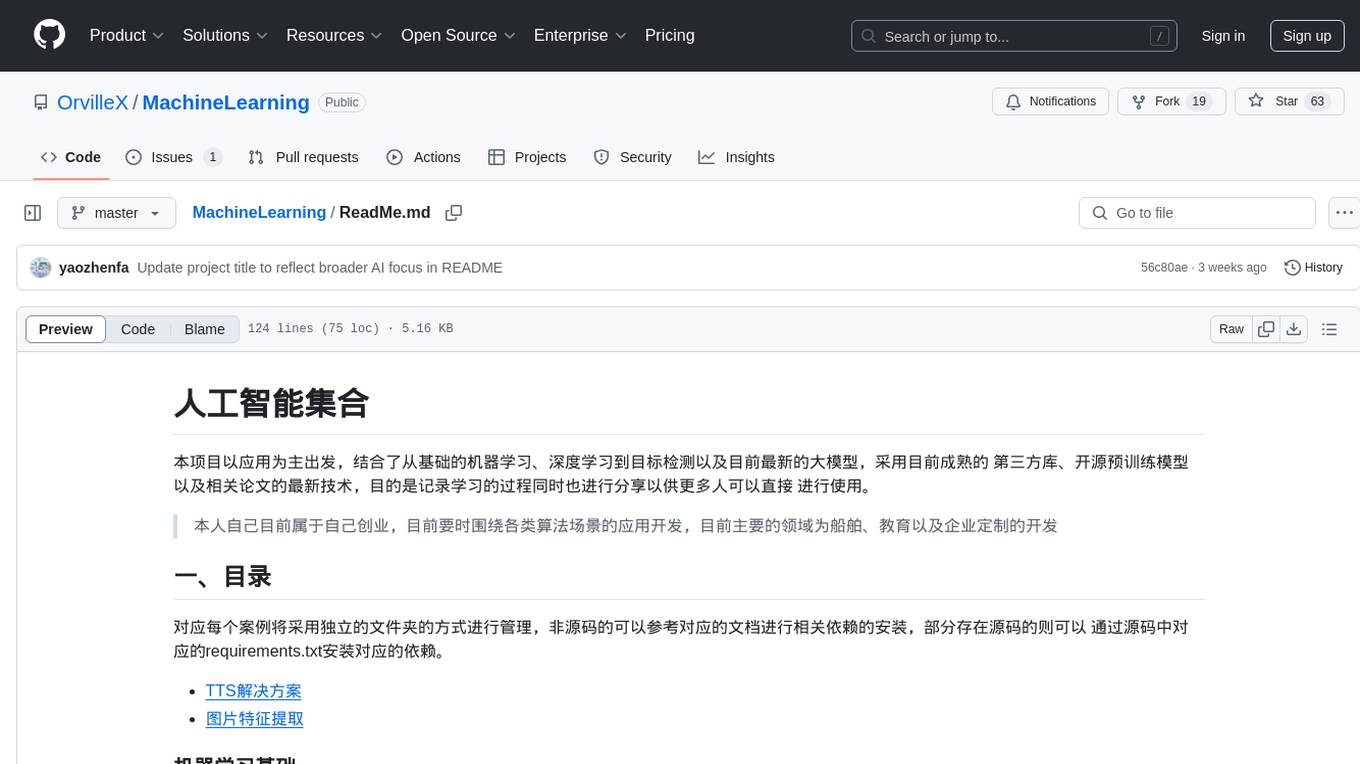
MachineLearning
MachineLearning is a repository focused on practical applications in various algorithm scenarios such as ship, education, and enterprise development. It covers a wide range of topics from basic machine learning and deep learning to object detection and the latest large models. The project utilizes mature third-party libraries, open-source pre-trained models, and the latest technologies from related papers to document the learning process and facilitate direct usage by a wider audience.
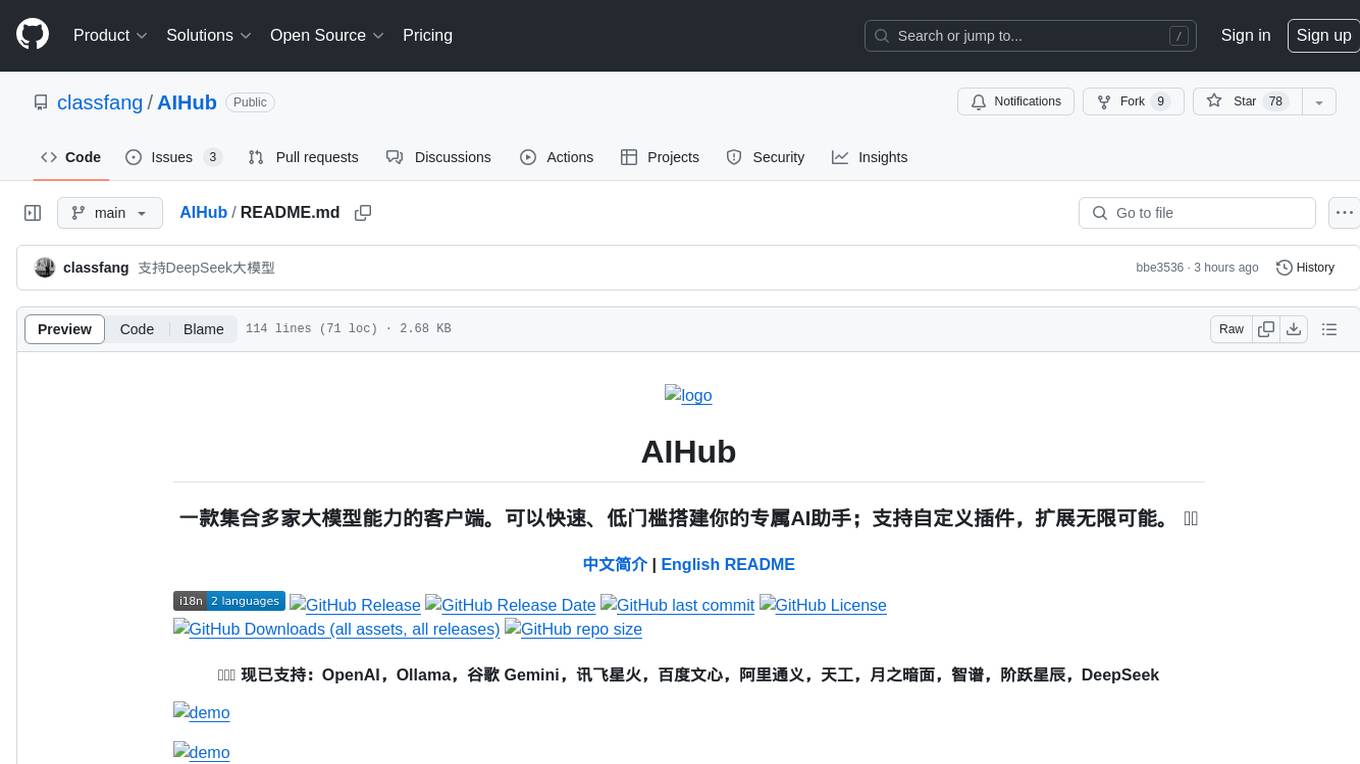
AIHub
AIHub is a client that integrates the capabilities of multiple large models, allowing users to quickly and easily build their own personalized AI assistants. It supports custom plugins for endless possibilities. The tool provides powerful AI capabilities, rich configuration options, customization of AI assistants for text and image conversations, AI drawing, installation of custom plugins, personal knowledge base building, AI calendar generation, support for AI mini programs, and ongoing development of additional features. Users can download the application package from the release section, resolve issues related to macOS app installation, and contribute ideas by submitting issues. The project development involves installation, development, and building processes for different operating systems.
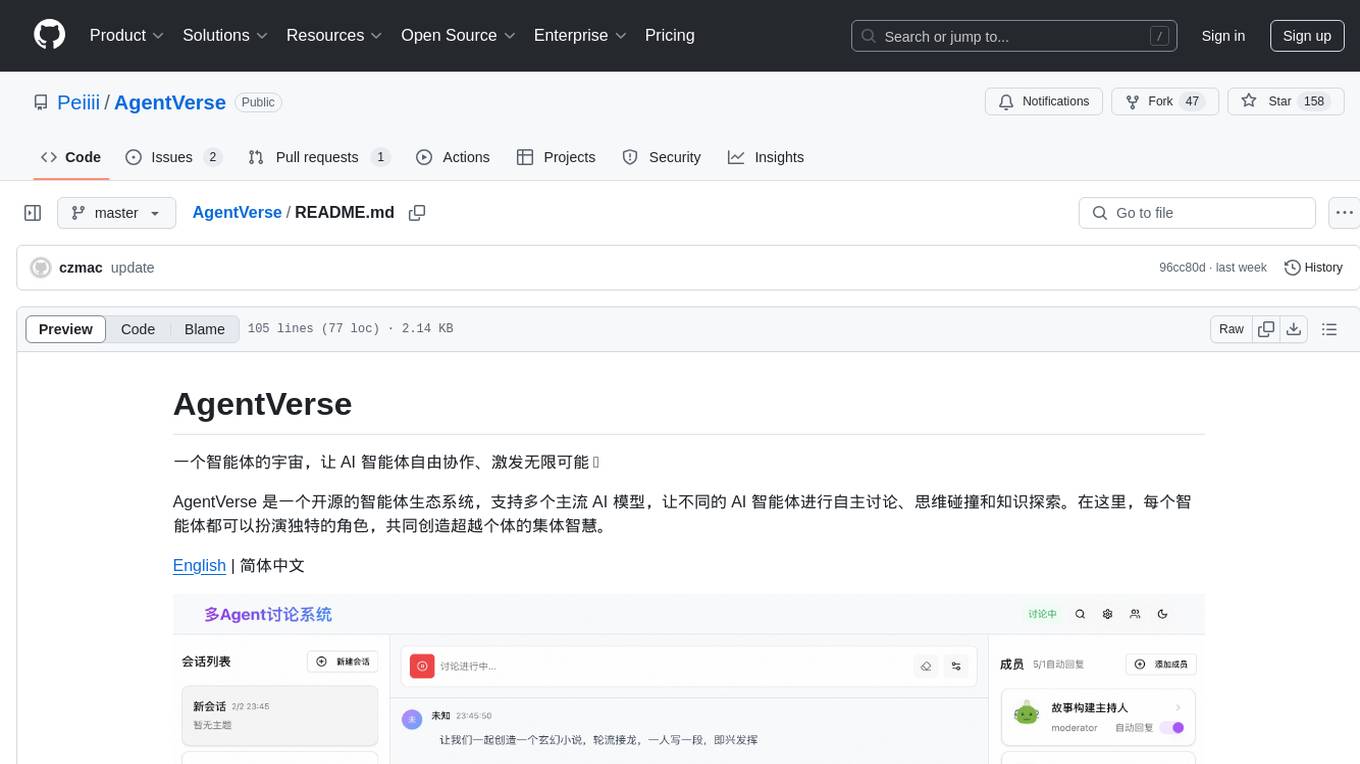
AgentVerse
AgentVerse is an open-source ecosystem for intelligent agents, supporting multiple mainstream AI models to facilitate autonomous discussions, thought collisions, and knowledge exploration. Each intelligent agent can play a unique role here, collectively creating wisdom beyond individuals.
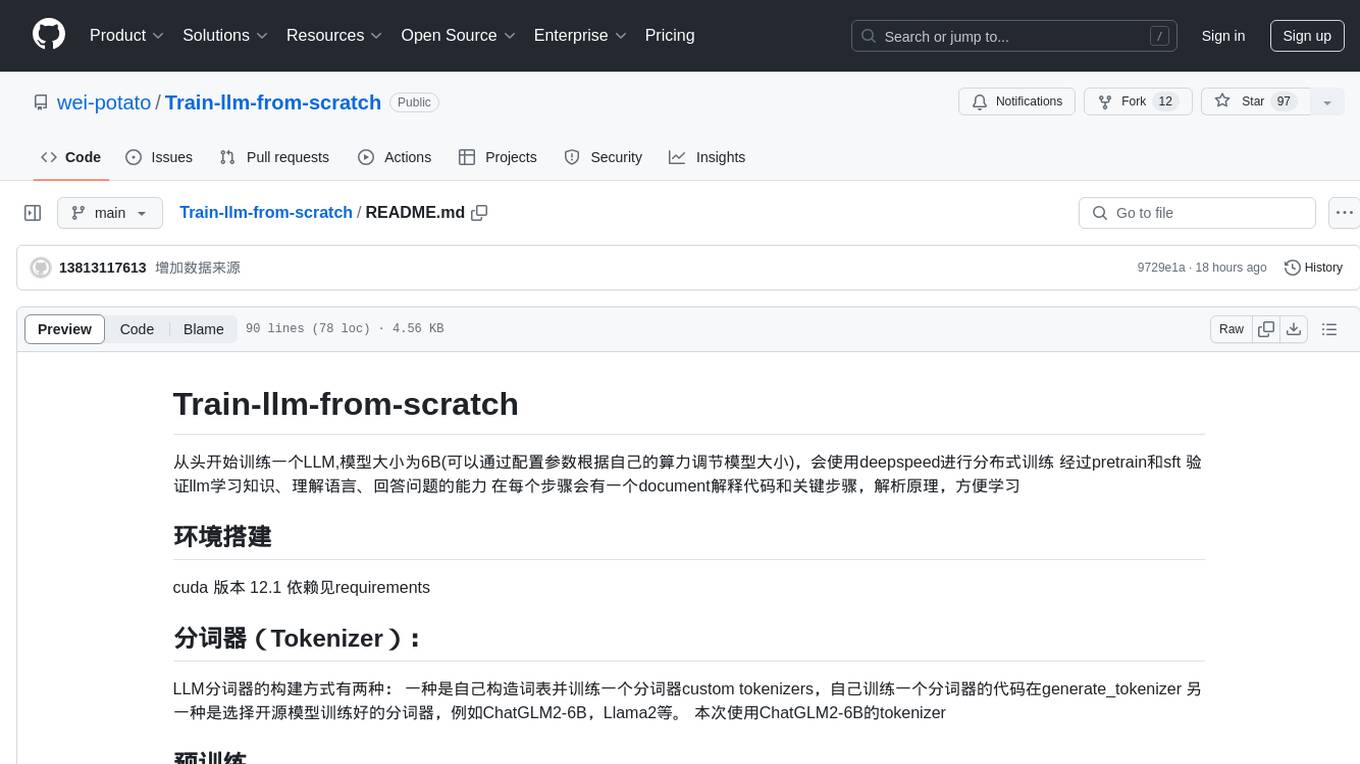
Train-llm-from-scratch
Train-llm-from-scratch is a repository that guides users through training a Large Language Model (LLM) from scratch. The model size can be adjusted based on available computing power. The repository utilizes deepspeed for distributed training and includes detailed explanations of the code and key steps at each stage to facilitate learning. Users can train their own tokenizer or use pre-trained tokenizers like ChatGLM2-6B. The repository provides information on preparing pre-training data, processing training data, and recommended SFT data for fine-tuning. It also references other projects and books related to LLM training.
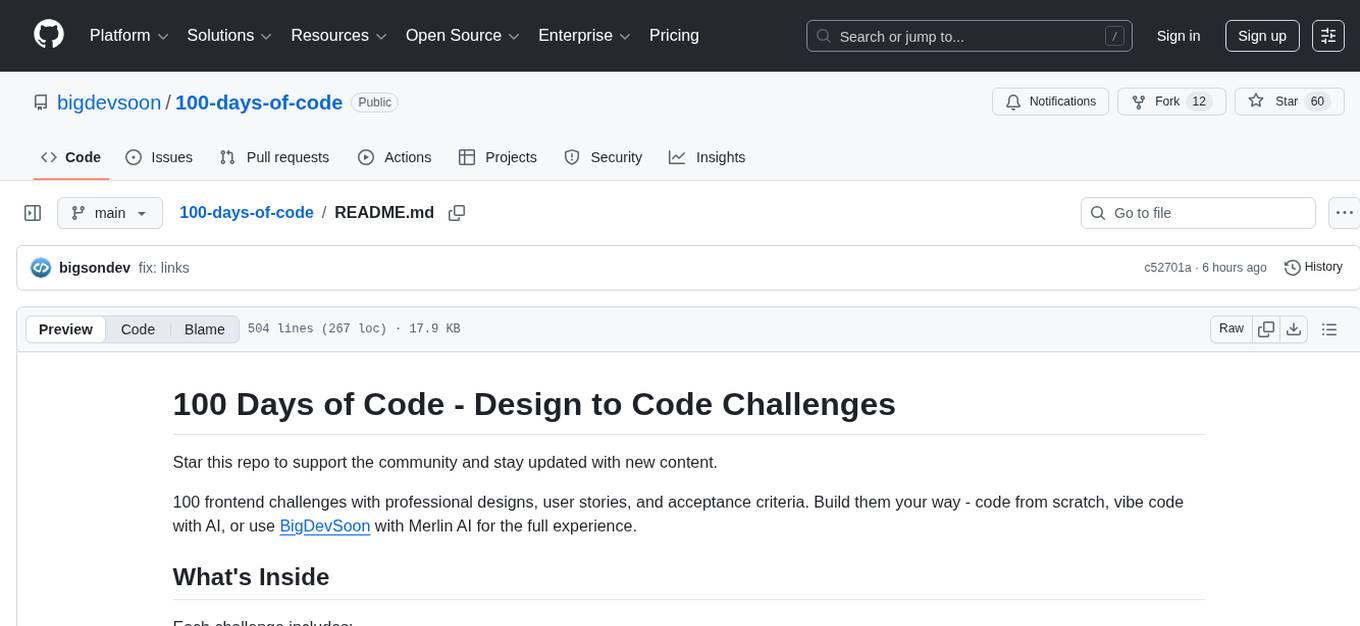
100-days-of-code
100 Days of Code is a repository containing 100 frontend challenges with professional designs, user stories, and acceptance criteria. It provides a platform for developers to practice coding daily, from beginner-friendly cards to advanced dashboards. The challenges are structured for AI collaboration, allowing users to work with coding agents like Claude, Cursor, and GitHub Copilot. The repository also includes an AI Collaboration Log template to document the use of AI tools and showcase effective collaboration. Developers can replicate design mockups, add interactivity with JavaScript, and share their solutions on social media platforms.
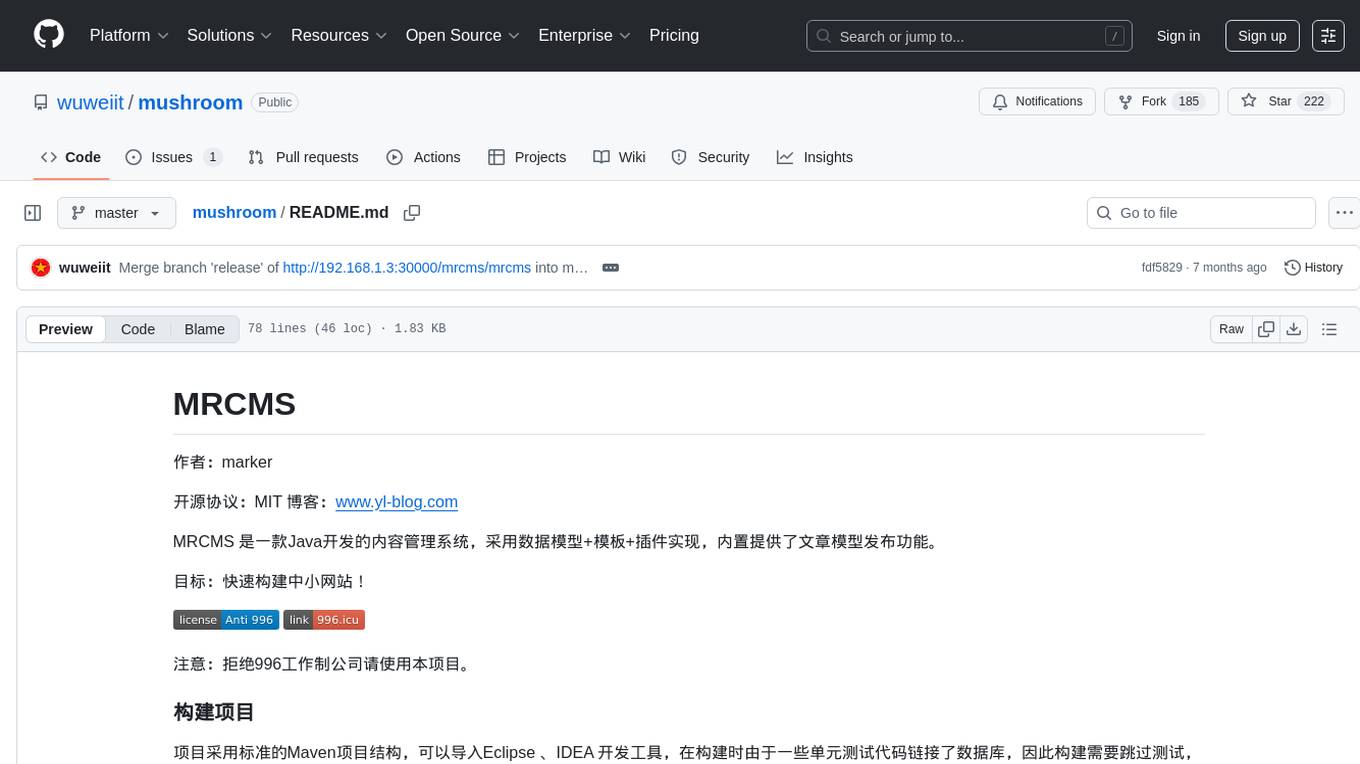
mushroom
MRCMS is a Java-based content management system that uses data model + template + plugin implementation, providing built-in article model publishing functionality. The goal is to quickly build small to medium websites.
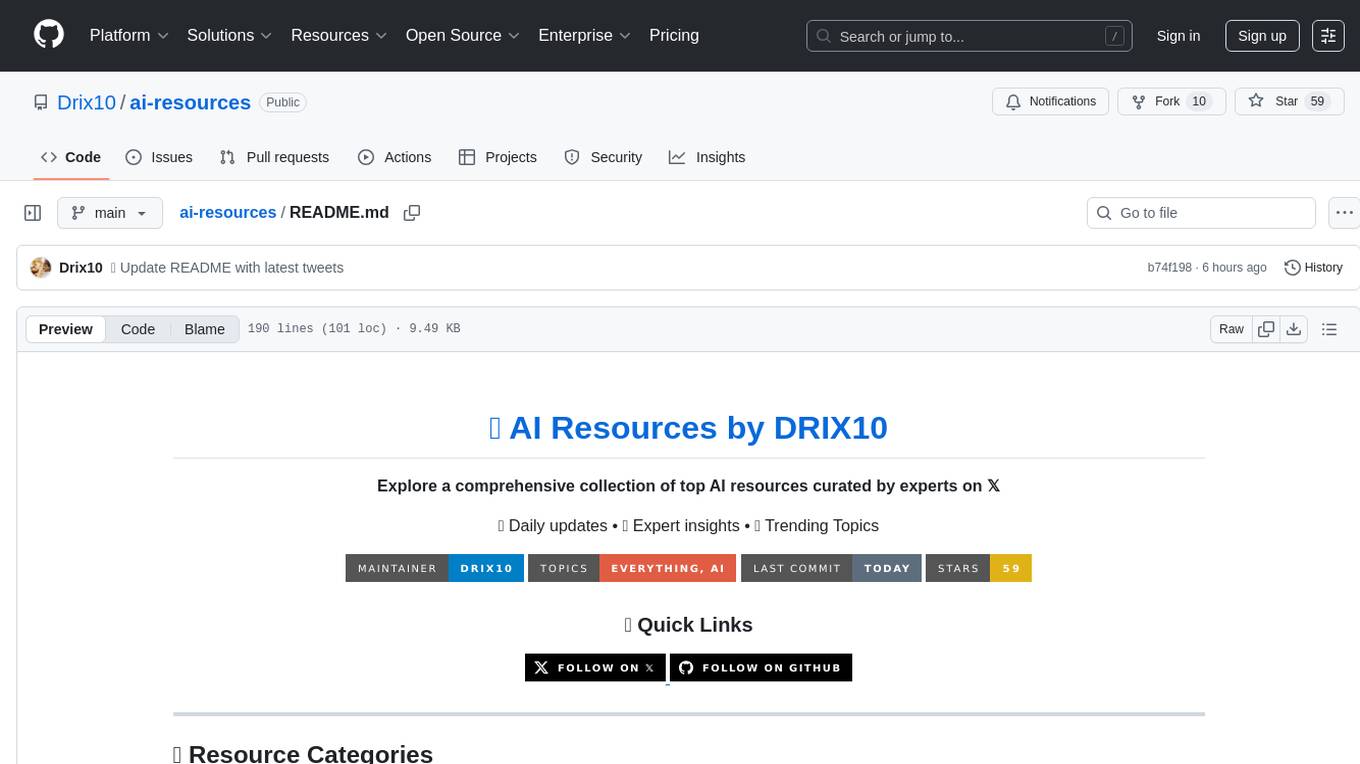
ai-resources
AI Resources by DRIX10 is a comprehensive collection of top AI resources curated by experts. It provides daily updates, expert insights, and trending topics across various categories such as AI Developer Tools, AI Education, AI Artists and Creators, AI Companies and Ventures, and more. Users can explore resources related to different aspects of AI, including healthcare, music generation, real estate, content creation, climate technology, cybersecurity, and more.
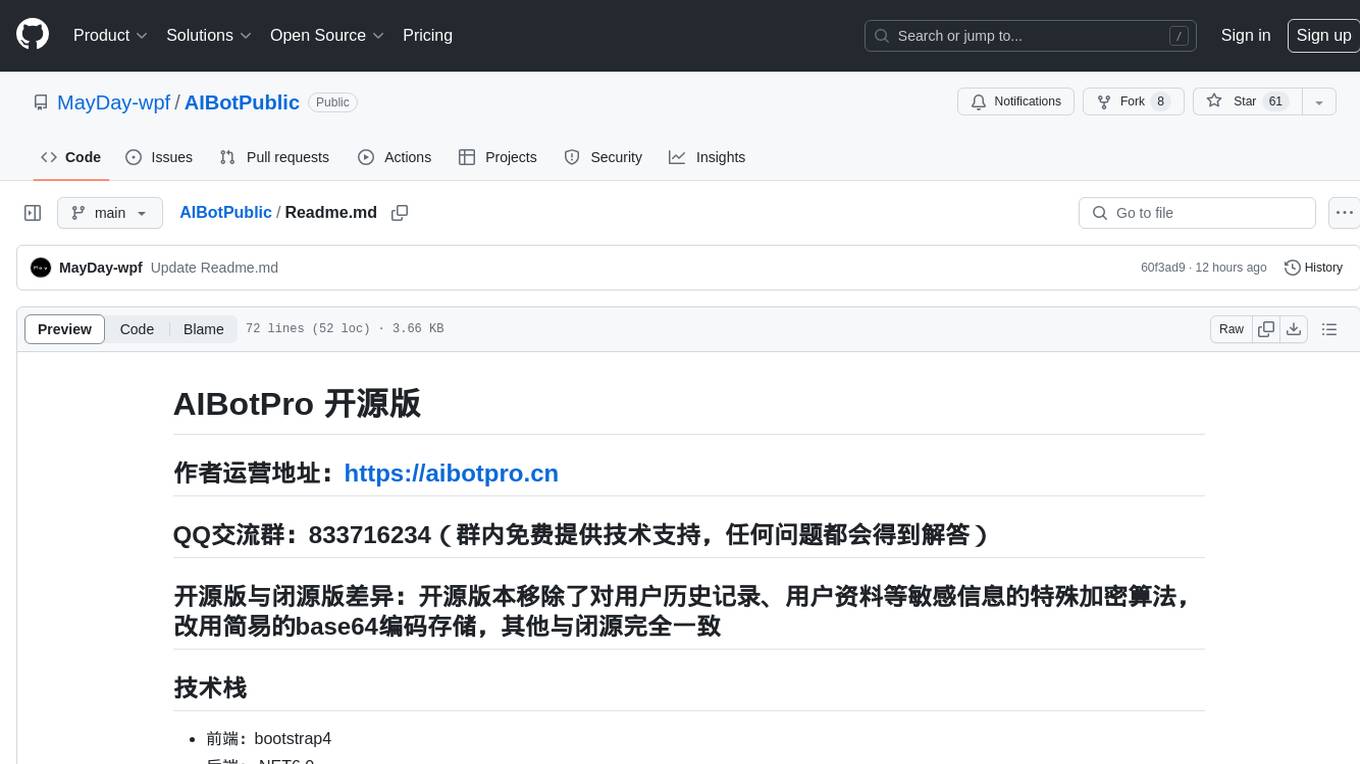
AIBotPublic
AIBotPublic is an open-source version of AIBotPro, a comprehensive AI tool that provides various features such as knowledge base construction, AI drawing, API hosting, and more. It supports custom plugins and parallel processing of multiple files. The tool is built using bootstrap4 for the frontend, .NET6.0 for the backend, and utilizes technologies like SqlServer, Redis, and Milvus for database and vector database functionalities. It integrates third-party dependencies like Baidu AI OCR, Milvus C# SDK, Google Search, and more to enhance its capabilities.
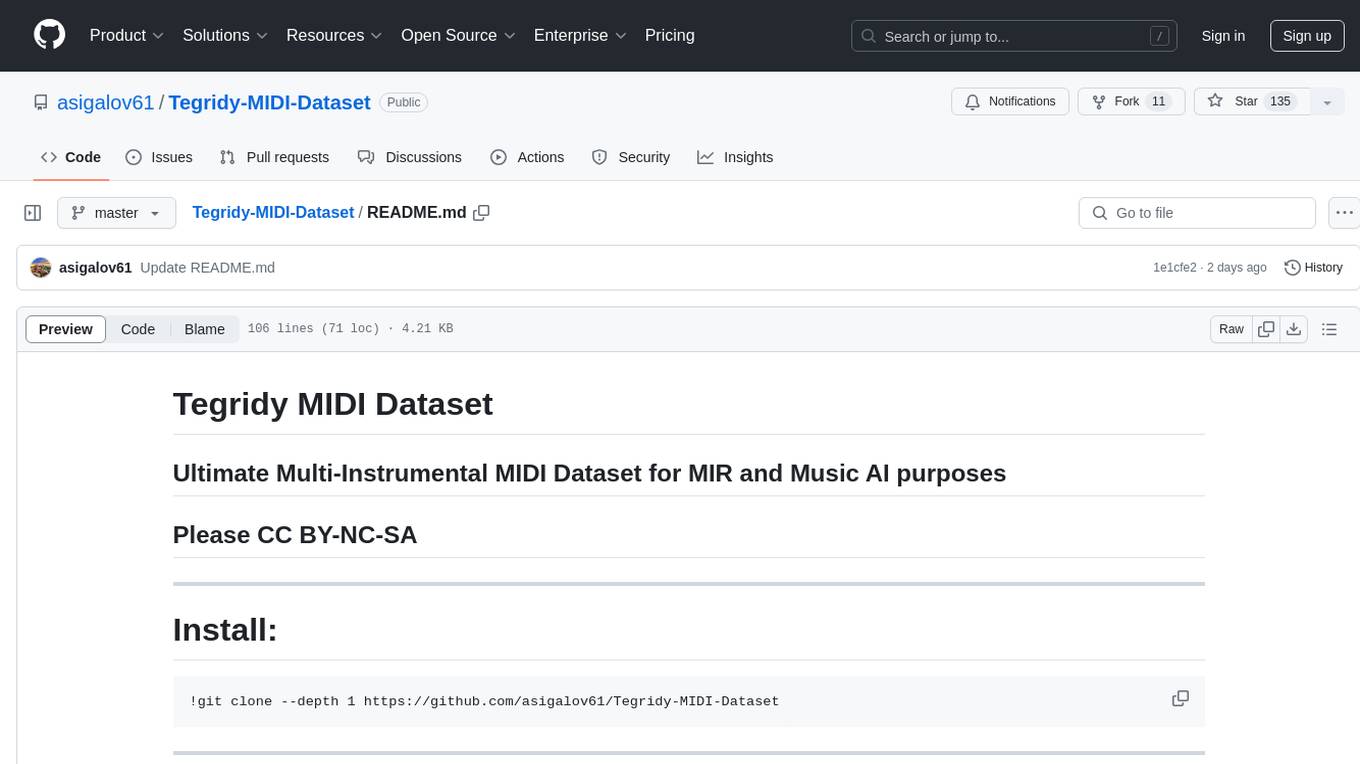
Tegridy-MIDI-Dataset
Tegridy MIDI Dataset is an ultimate multi-instrumental MIDI dataset designed for Music Information Retrieval (MIR) and Music AI purposes. It provides a comprehensive collection of MIDI datasets and essential software tools for MIDI editing, rendering, transcription, search, classification, comparison, and various other MIDI applications.
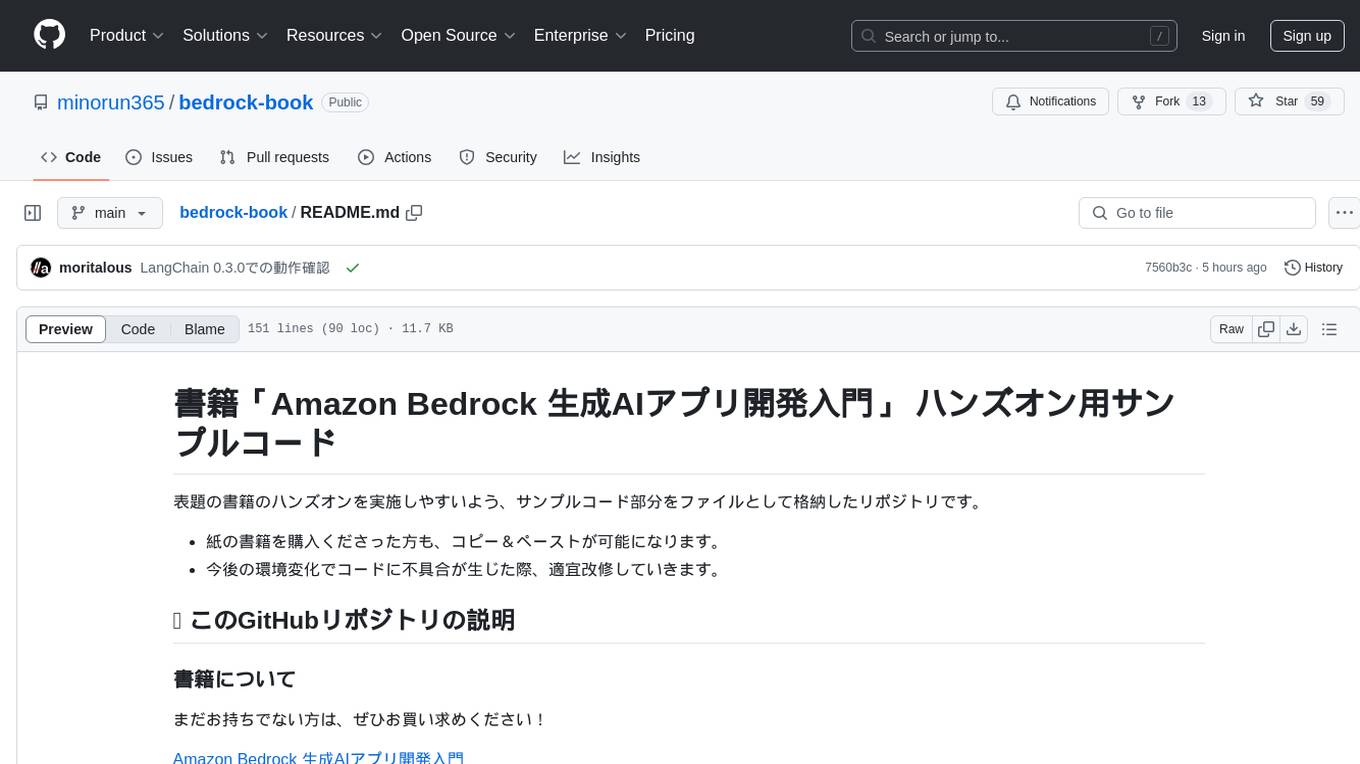
bedrock-book
This repository contains sample code for hands-on exercises related to the book 'Amazon Bedrock 生成AIアプリ開発入門'. It allows readers to easily access and copy the code. The repository also includes directories for each chapter's hands-on code, settings, and a 'requirements.txt' file listing necessary Python libraries. Updates and error fixes will be provided as needed. Users can report issues in the repository's 'Issues' section, and errata will be published on the SB Creative official website.
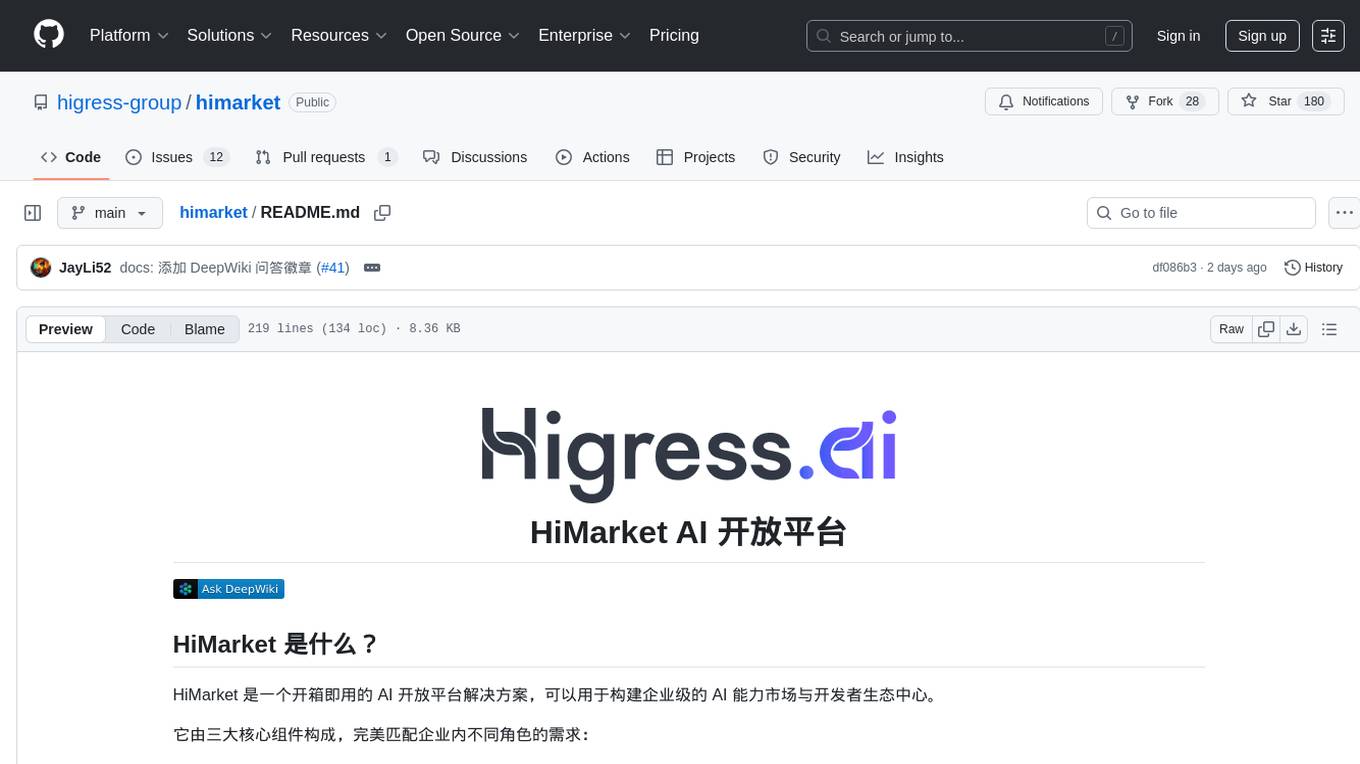
himarket
HiMarket is an out-of-the-box AI open platform solution that can be used to build enterprise-level AI capability markets and developer ecosystem centers. It consists of three core components tailored to different roles within the enterprise: 1. AI open platform management backend (for administrators/operators) for easy packaging of diverse AI capabilities such as model services, MCP Server, Agent, etc., into standardized 'AI products' in API form with comprehensive documentation and examples for one-click publishing to the portal. 2. AI open platform portal (for developers/internal users) as a 'storefront' for developers to complete registration, create consumers, obtain credentials, browse and subscribe to AI products, test online, and monitor their own call status and costs clearly. 3. AI Gateway: As a subproject of the Higress community, the Higress AI Gateway carries out all AI call authentication, security, flow control, protocol conversion, and observability capabilities.
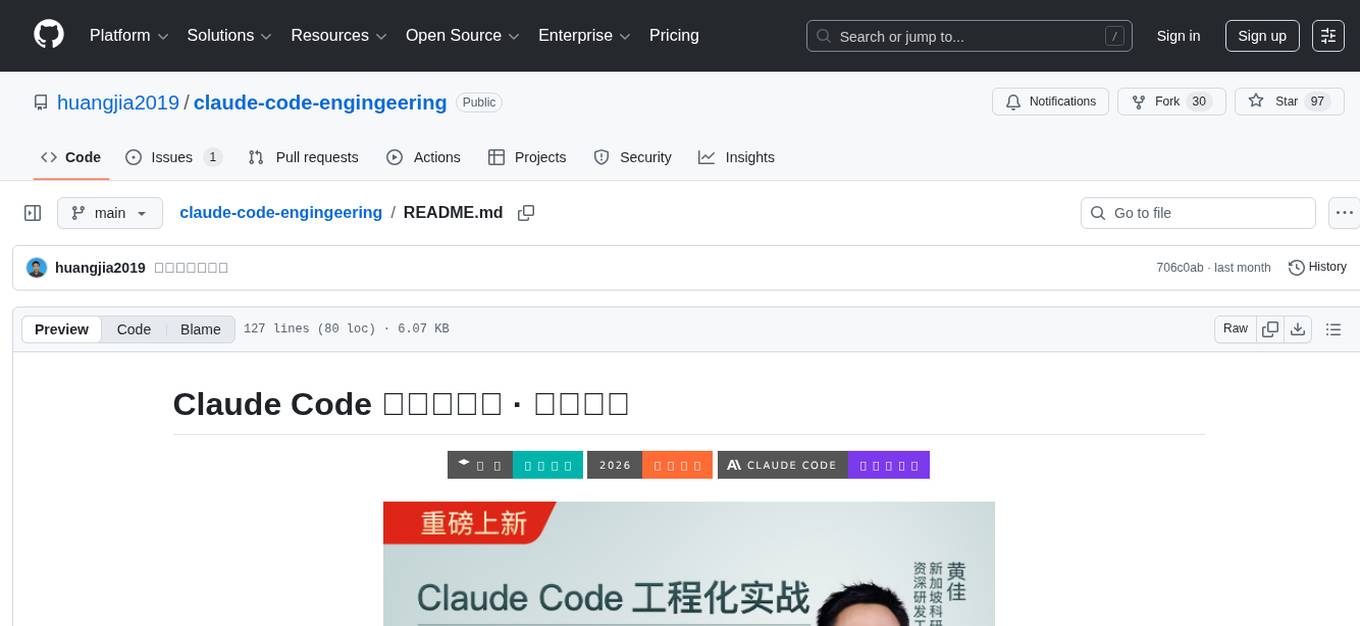
claude-code-engingeering
Claude Code is an advanced AI Agent framework that goes beyond a smart command-line tool. It is programmable, extensible, and composable, allowing users to teach it project specifications, split tasks into sub-agents, provide domain skills, automate responses to specific events, and integrate it into CI/CD pipelines for unmanned operation. The course aims to transform users from 'users' of Claude Code to 'masters' who can design agent 'memories', delegate tasks to sub-agents, build reusable skill packages, drive automation workflows with code, and collaborate with intelligent agents in a dance of development.
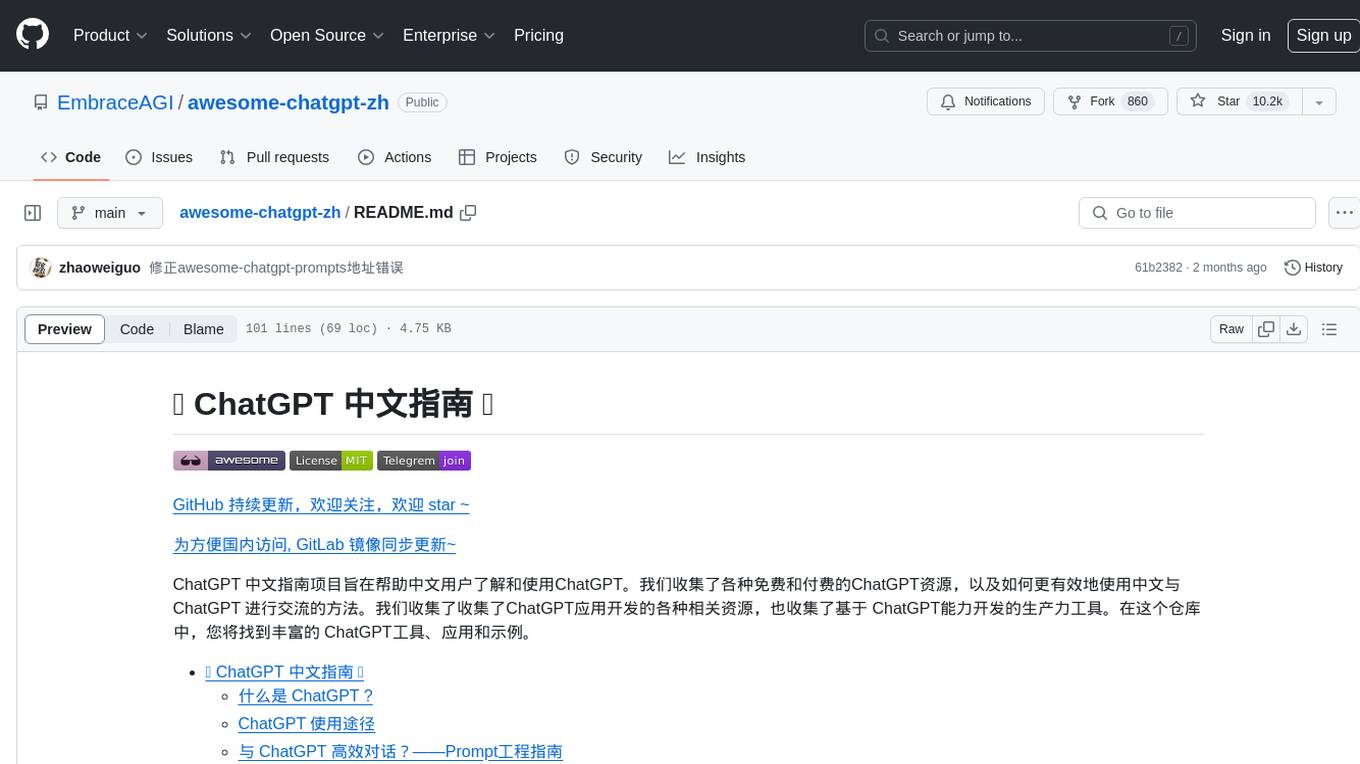
awesome-chatgpt-zh
The Awesome ChatGPT Chinese Guide project aims to help Chinese users understand and use ChatGPT. It collects various free and paid ChatGPT resources, as well as methods to communicate more effectively with ChatGPT in Chinese. The repository contains a rich collection of ChatGPT tools, applications, and examples.
For similar tasks
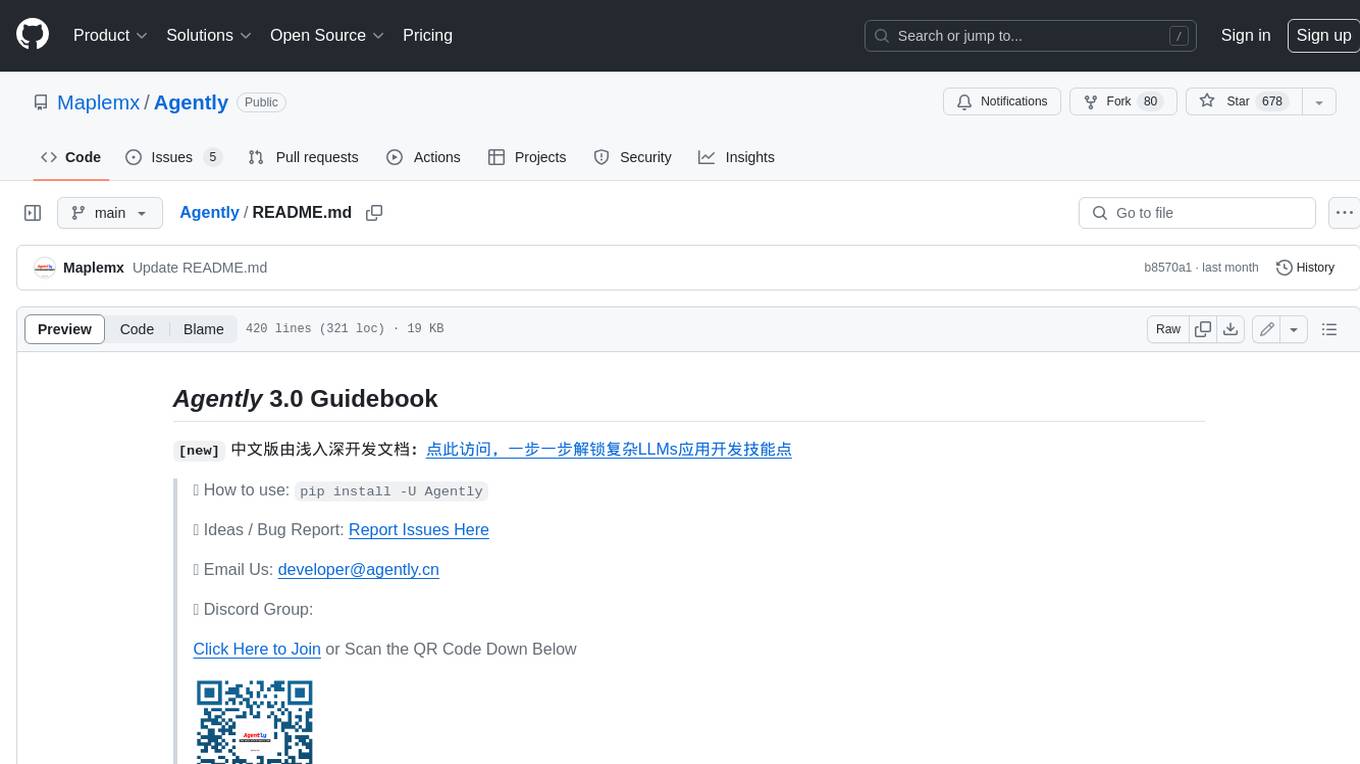
Agently
Agently is a development framework that helps developers build AI agent native application really fast. You can use and build AI agent in your code in an extremely simple way. You can create an AI agent instance then interact with it like calling a function in very few codes like this below. Click the run button below and witness the magic. It's just that simple: python # Import and Init Settings import Agently agent = Agently.create_agent() agent\ .set_settings("current_model", "OpenAI")\ .set_settings("model.OpenAI.auth", {"api_key": ""}) # Interact with the agent instance like calling a function result = agent\ .input("Give me 3 words")\ .output([("String", "one word")])\ .start() print(result) ['apple', 'banana', 'carrot'] And you may notice that when we print the value of `result`, the value is a `list` just like the format of parameter we put into the `.output()`. In Agently framework we've done a lot of work like this to make it easier for application developers to integrate Agent instances into their business code. This will allow application developers to focus on how to build their business logic instead of figure out how to cater to language models or how to keep models satisfied.
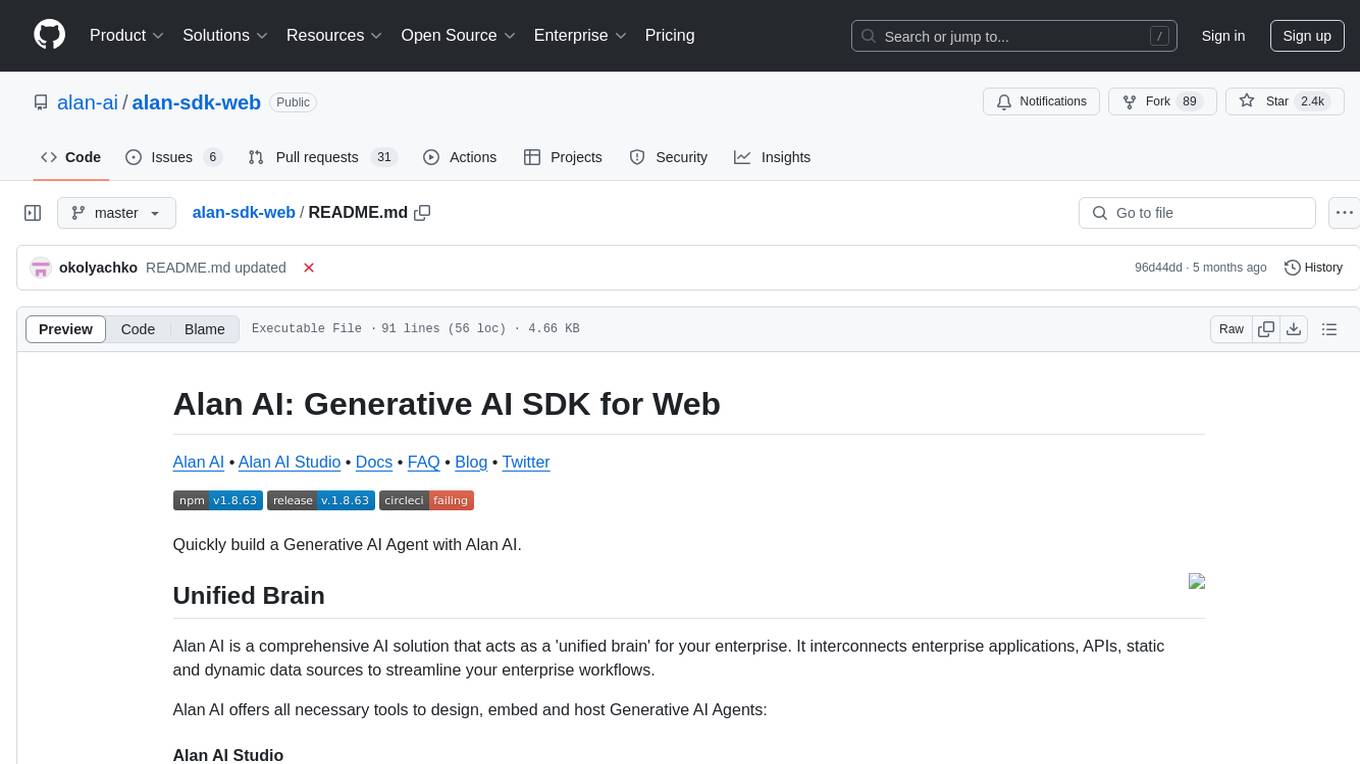
alan-sdk-web
Alan AI is a comprehensive AI solution that acts as a 'unified brain' for enterprises, interconnecting applications, APIs, and data sources to streamline workflows. It offers tools like Alan AI Studio for designing dialog scenarios, lightweight SDKs for embedding AI Agents, and a backend powered by advanced AI technologies. With Alan AI, users can create conversational experiences with minimal UI changes, benefit from a serverless environment, receive on-the-fly updates, and access dialog testing and analytics tools. The platform supports various frameworks like JavaScript, React, Angular, Vue, Ember, and Electron, and provides example web apps for different platforms. Users can also explore Alan AI SDKs for iOS, Android, Flutter, Ionic, Apache Cordova, and React Native.
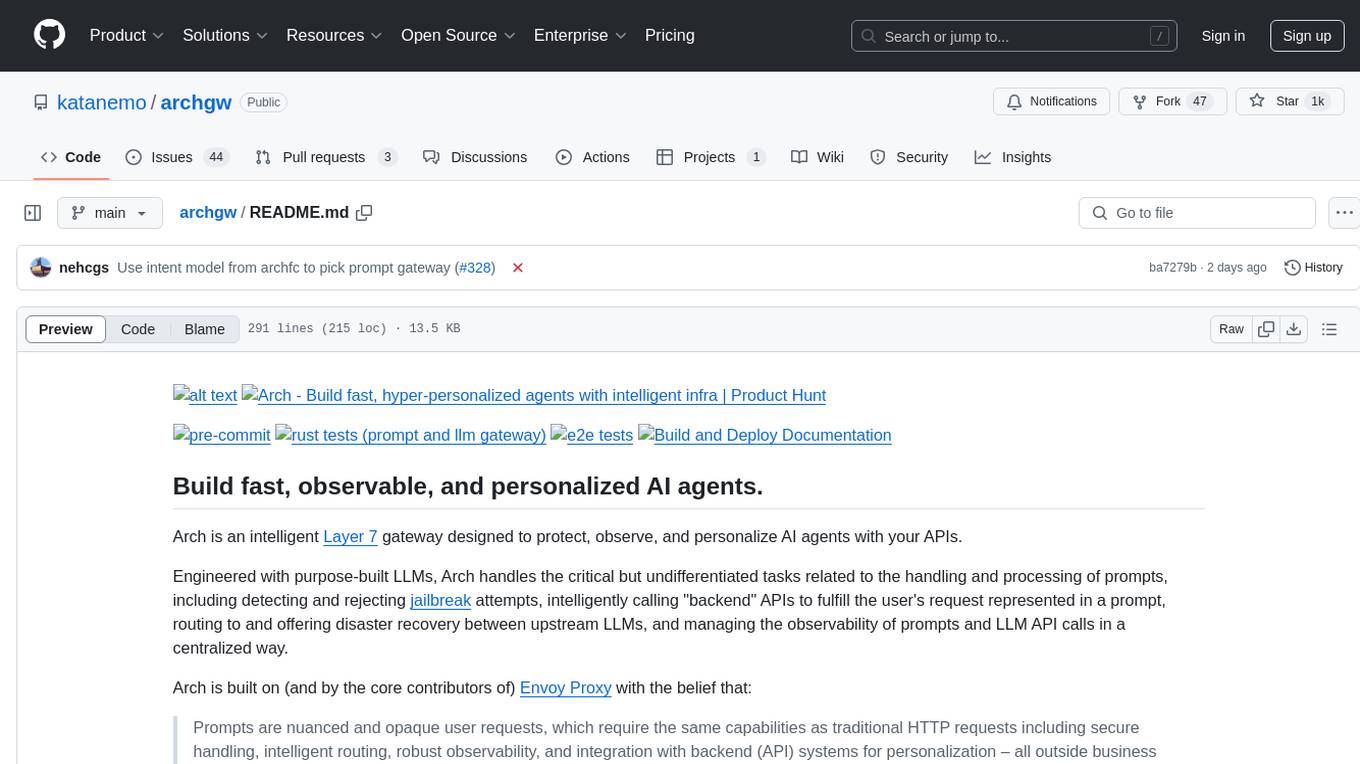
archgw
Arch is an intelligent Layer 7 gateway designed to protect, observe, and personalize AI agents with APIs. It handles tasks related to prompts, including detecting jailbreak attempts, calling backend APIs, routing between LLMs, and managing observability. Built on Envoy Proxy, it offers features like function calling, prompt guardrails, traffic management, and observability. Users can build fast, observable, and personalized AI agents using Arch to improve speed, security, and personalization of GenAI apps.

llm-dev
The 'llm-dev' repository contains source code and resources for the book 'Practical Projects of Large Models: Multi-Domain Intelligent Application Development'. It covers topics such as language model basics, application architecture, working modes, environment setup, model installation, fine-tuning, quantization, multi-modal model applications, chat applications, programming large model applications, VS Code plugin development, enhanced generation applications, translation applications, intelligent agent applications, speech model applications, digital human applications, model training applications, and AI town applications.
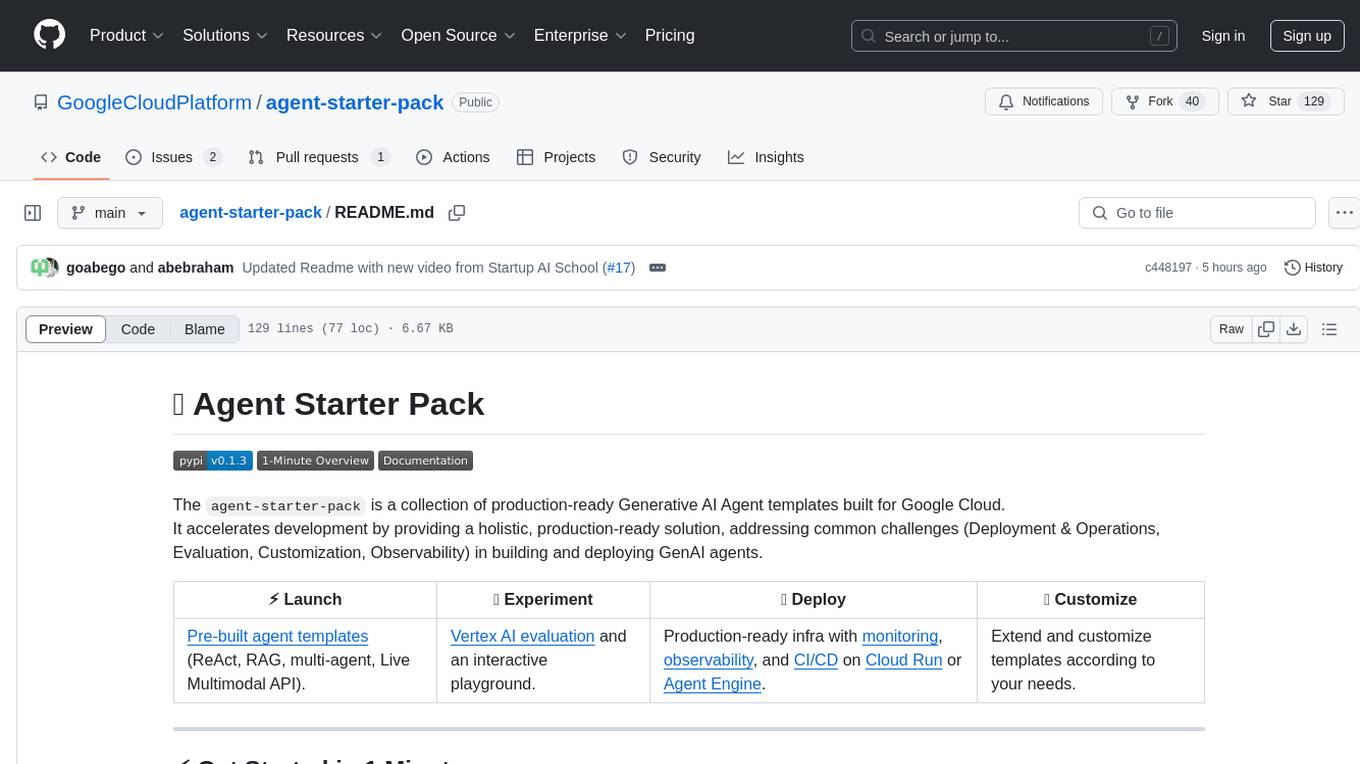
agent-starter-pack
The agent-starter-pack is a collection of production-ready Generative AI Agent templates built for Google Cloud. It accelerates development by providing a holistic, production-ready solution, addressing common challenges in building and deploying GenAI agents. The tool offers pre-built agent templates, evaluation tools, production-ready infrastructure, and customization options. It also provides CI/CD automation and data pipeline integration for RAG agents. The starter pack covers all aspects of agent development, from prototyping and evaluation to deployment and monitoring. It is designed to simplify project creation, template selection, and deployment for agent development on Google Cloud.
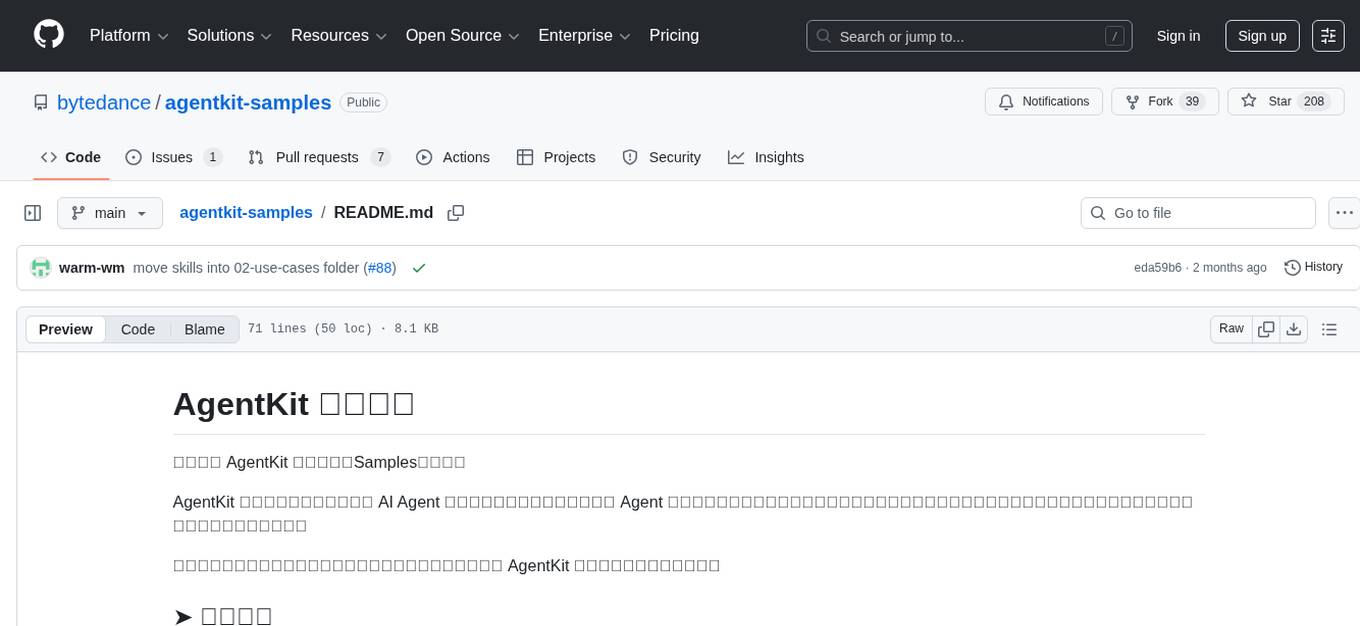
agentkit-samples
AgentKit Samples is a repository containing a series of examples and tutorials to help users understand, implement, and integrate various functionalities of AgentKit into their applications. The platform offers a complete solution for building, deploying, and maintaining AI agents, significantly reducing the complexity of developing intelligent applications. The repository provides different levels of examples and tutorials, including basic tutorials for understanding AgentKit's concepts and use cases, as well as more complex examples for experienced developers.
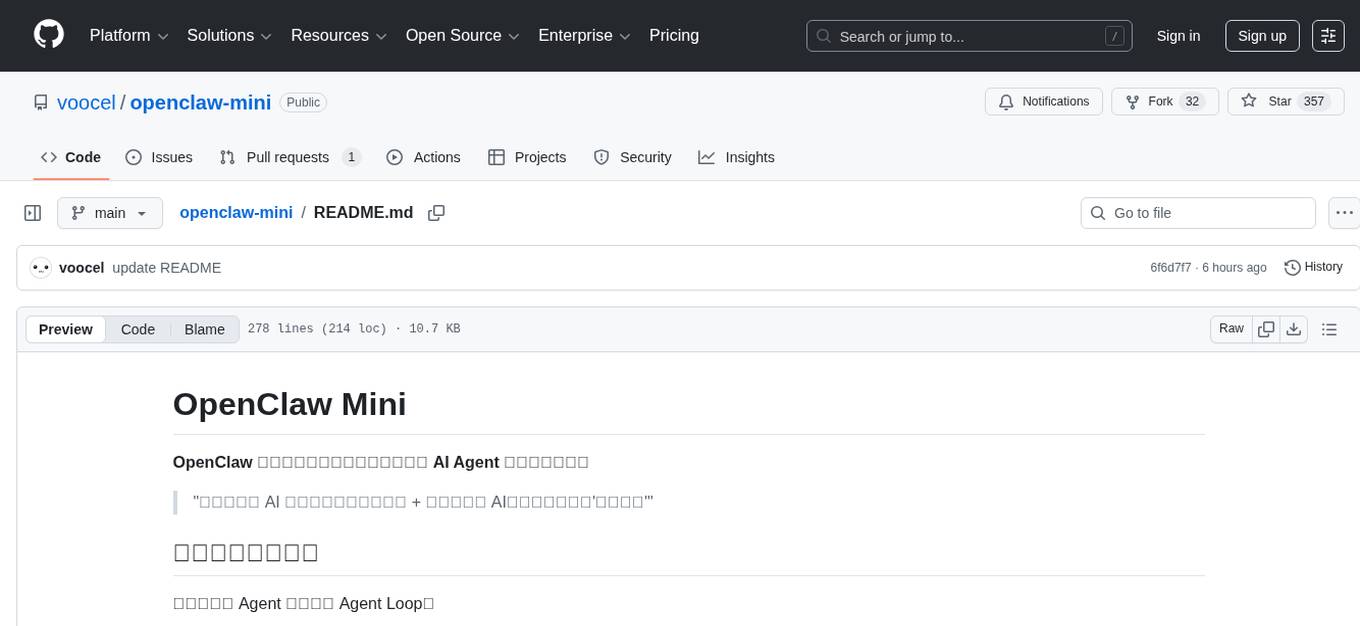
openclaw-mini
OpenClaw Mini is a simplified reproduction of the core architecture of OpenClaw, designed for learning system-level design of AI agents. It focuses on understanding the Agent Loop, session persistence, context management, long-term memory, skill systems, and active awakening. The project provides a minimal implementation to help users grasp the core design concepts of a production-level AI agent system.
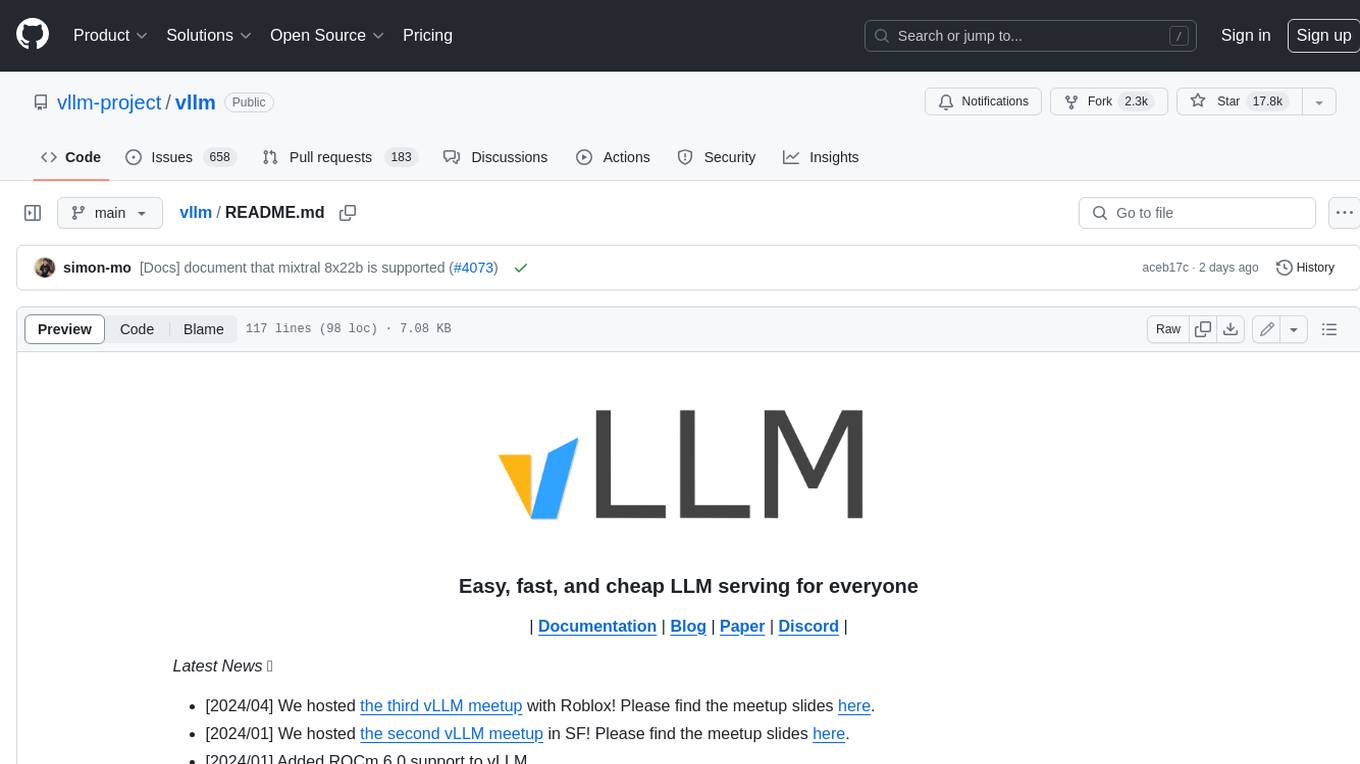
vllm
vLLM is a fast and easy-to-use library for LLM inference and serving. It is designed to be efficient, flexible, and easy to use. vLLM can be used to serve a variety of LLM models, including Hugging Face models. It supports a variety of decoding algorithms, including parallel sampling, beam search, and more. vLLM also supports tensor parallelism for distributed inference and streaming outputs. It is open-source and available on GitHub.
For similar jobs

sweep
Sweep is an AI junior developer that turns bugs and feature requests into code changes. It automatically handles developer experience improvements like adding type hints and improving test coverage.

teams-ai
The Teams AI Library is a software development kit (SDK) that helps developers create bots that can interact with Teams and Microsoft 365 applications. It is built on top of the Bot Framework SDK and simplifies the process of developing bots that interact with Teams' artificial intelligence capabilities. The SDK is available for JavaScript/TypeScript, .NET, and Python.

ai-guide
This guide is dedicated to Large Language Models (LLMs) that you can run on your home computer. It assumes your PC is a lower-end, non-gaming setup.

classifai
Supercharge WordPress Content Workflows and Engagement with Artificial Intelligence. Tap into leading cloud-based services like OpenAI, Microsoft Azure AI, Google Gemini and IBM Watson to augment your WordPress-powered websites. Publish content faster while improving SEO performance and increasing audience engagement. ClassifAI integrates Artificial Intelligence and Machine Learning technologies to lighten your workload and eliminate tedious tasks, giving you more time to create original content that matters.

chatbot-ui
Chatbot UI is an open-source AI chat app that allows users to create and deploy their own AI chatbots. It is easy to use and can be customized to fit any need. Chatbot UI is perfect for businesses, developers, and anyone who wants to create a chatbot.

BricksLLM
BricksLLM is a cloud native AI gateway written in Go. Currently, it provides native support for OpenAI, Anthropic, Azure OpenAI and vLLM. BricksLLM aims to provide enterprise level infrastructure that can power any LLM production use cases. Here are some use cases for BricksLLM: * Set LLM usage limits for users on different pricing tiers * Track LLM usage on a per user and per organization basis * Block or redact requests containing PIIs * Improve LLM reliability with failovers, retries and caching * Distribute API keys with rate limits and cost limits for internal development/production use cases * Distribute API keys with rate limits and cost limits for students

uAgents
uAgents is a Python library developed by Fetch.ai that allows for the creation of autonomous AI agents. These agents can perform various tasks on a schedule or take action on various events. uAgents are easy to create and manage, and they are connected to a fast-growing network of other uAgents. They are also secure, with cryptographically secured messages and wallets.

griptape
Griptape is a modular Python framework for building AI-powered applications that securely connect to your enterprise data and APIs. It offers developers the ability to maintain control and flexibility at every step. Griptape's core components include Structures (Agents, Pipelines, and Workflows), Tasks, Tools, Memory (Conversation Memory, Task Memory, and Meta Memory), Drivers (Prompt and Embedding Drivers, Vector Store Drivers, Image Generation Drivers, Image Query Drivers, SQL Drivers, Web Scraper Drivers, and Conversation Memory Drivers), Engines (Query Engines, Extraction Engines, Summary Engines, Image Generation Engines, and Image Query Engines), and additional components (Rulesets, Loaders, Artifacts, Chunkers, and Tokenizers). Griptape enables developers to create AI-powered applications with ease and efficiency.
